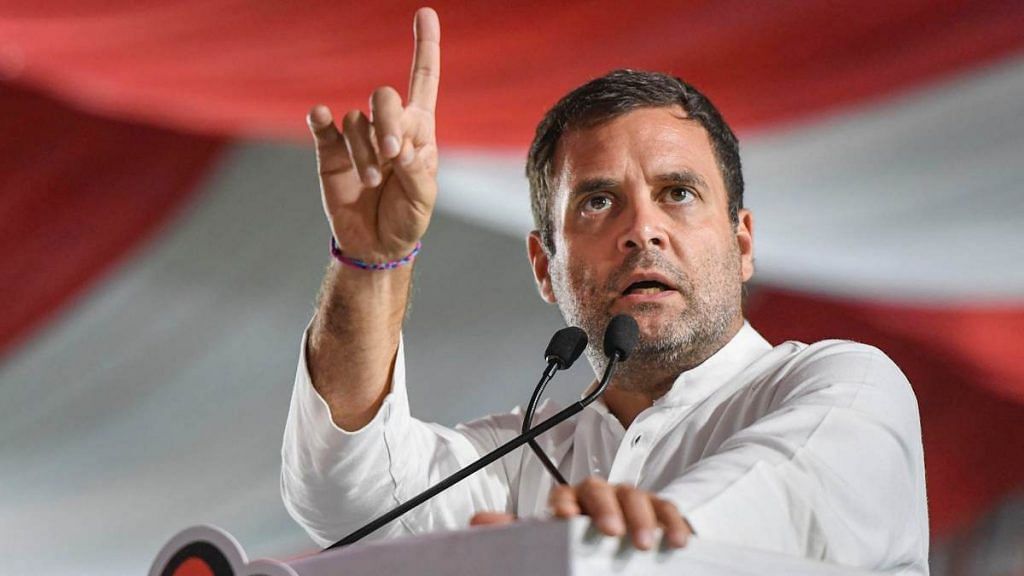New Delhi: The Congress party is looking to attack the Narendra Modi government’s new farm bills that seek to liberalise agricultural markets, but the party had itself promised similar reforms just a year ago.
On Thursday, soon after Parliament passed the Farmers’ Produce Trade and Commerce (Promotion and Facilitation) Bill, and the Farmers (Empowerment and Protection) Agreement on Price Assurance and Farm Services Bill, Congress leader Rahul Gandhi hit out at the government saying it is bringing in “black laws to economically exploit the peasant-agricultural labourers”.
मोदी जी ने किसानों की आय दुगनी करने का वादा किया था।
लेकिन मोदी सरकार के ‘काले’ क़ानून किसान-खेतिहर मज़दूर का आर्थिक शोषण करने के लिए बनाए जा रहे हैं।
ये 'ज़मींदारी' का नया रूप है और मोदी जी के कुछ ‘मित्र’ नए भारत के ‘ज़मींदार’ होंगे।
कृषि मंडी हटी, देश की खाद्य सुरक्षा मिटी।
— Rahul Gandhi (@RahulGandhi) September 17, 2020
Congress MPs also raised slogans inside the Parliament complex, calling the Bills a “death knell for the future of farming”. The party also strongly opposed The Essential Commodities (Amendment) Bill passed earlier this week.
These moves came despite the party’s promise to support similar reforms in its election manifesto last year, which the ruling BJP highlighted as doublespeak.
‘Age of controls’
In its 2019 Lok Sabha elections manifesto, the Congress had said, “The Essential Commodities Act, 1955 belongs to the age of controls. Congress promises to replace the Act by an enabling law that can be invoked only in the case of emergencies.”
The party had also promised to repeal the Agricultural Produce Market Committees (APMC) Act. This is precisely what the Farming Produce Trade and Commerce Bill seeks to do by allowing barrier-free, inter- and intra-state trade of primary agricultural commodities.
So far, farmers would sell their produce in APMCs across the country, which were established and regulated under the state APMC Acts.
“Congress will repeal the Agricultural Produce Market Committees Act and make trade in agricultural produce—including exports and inter-state trade — free from all restrictions,” the Congress’ manifesto had said.
Pointing this out, BJP president J.P. Nadda accused the Congress of “conveniently forgetting its own stand” over farm reforms.
Also read: Onion export ban is not the answer — it hurts farmers & India’s image as a reliable exporter
‘Our replacement would have been pro-farmer’
In response to the BJP charge, the Congress defended its position, saying it “never argued for price exploitation by private entities”, and was always in favour of cooperative federalism.
“The Congress manifesto never promoted the idea of abolition of the Minimum Support Price (MSP), unlike the present bills passed by the BJP,” Congress spokesperson Jaiveer Shergill told ThePrint.
“The Congress manifesto never contained any clause which would open a window of price exploitation by private entities.”
While Agriculture Minister Narendra Singh Tomar has assured that the MSP procurement system will continue, farmers protesting against the legislation have expressed concern that the new laws would pave the way for the dismantling of the MSP system, leaving them at the mercy of big farmers or corporates.
Shergill argued that the laws which were passed in Parliament “do not make MSP a mandatory condition”, raising these concerns. He also defended the manifesto promise of repealing the commodities law.
“The repeal of the Essential Commodities Act was promised with the assurance that another law will be brought in place, the nature and colour of which would be pro-farmer, and not lead to price inflation or unnecessary stocking of vegetables, as is a concern now,” he said.
The Essential Commodities (Amendment) Act removes cereals, pulses, oilseeds, edible oils, onion and potatoes from the list of essential commodities. This means that it will deregulate the production, storage, movement and distribution of these commodities.
Shergill also accused the BJP of “bypassing all norms of cooperative federalism.”
“Agriculture falls under the jurisdiction of the state. The bulldozing of these bills through the Parliament is nothing but the death of cooperative federalism. Right now, no opportunity was given to state government across India to deliberate the law, to make it more farmer-oriented,” Shergill said.
Protests against bills
On Thursday, while burning copies of the bills in the Parliament complex in protest, Congress MPs Jasbir Singh Gill, Ravneet Singh Bittu, Gurjit Singh Aujla and Amar Singh said they will oppose the proposed legislations tooth and nail.
Even Harsimrat Kaur Badal, the only cabinet member from Shiromani Akali Dal, one of BJP’s oldest allies, resigned as the Union Food Processing Minister, slamming the reforms as “anti-farmer”.
Several farmers’ organisations, especially in Punjab and Haryana, have been carrying out demonstrations against the three laws.
Also read: What ‘breaking away’ could mean for Akalis and BJP after Harsimrat Badal’s resignation
